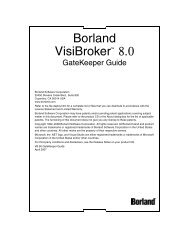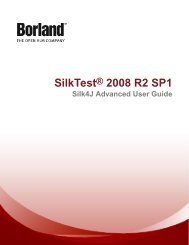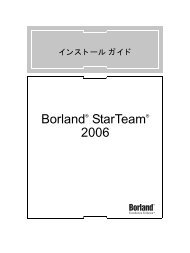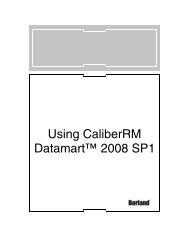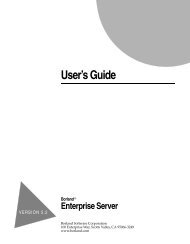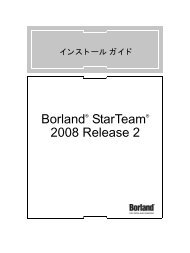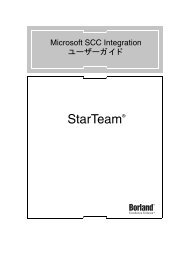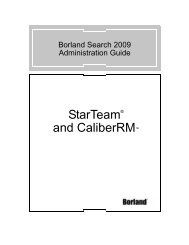web server - Borland Technical Publications
web server - Borland Technical Publications
web server - Borland Technical Publications
You also want an ePaper? Increase the reach of your titles
YUMPU automatically turns print PDFs into web optimized ePapers that Google loves.
Transaction manager services<br />
EJBs and 2PC transactions<br />
With the introduction of messaging in the J2EE platform, a number of common<br />
scenarios now exist involving access to multiple resources from EJBs in a single<br />
transaction. As we know, when more than one resource is involved in a transaction, the<br />
OTS engine is needed to reliably complete the transaction using the two-phase commit<br />
protocol. Sample scenarios include:<br />
■<br />
■<br />
A session bean accesses two types of entity beans in a transaction where each are<br />
persisted in a different database.<br />
A session bean accesses an entity bean and in the same transaction does some<br />
messaging work, such as sending a message to a JMS queue.<br />
■<br />
In the onMessage method of a message-driven bean, access entity beans on<br />
message delivery.<br />
In each of the above examples, two heterogeneous resources need to be accessed<br />
from within a session bean or a message-driven bean as part of a single transaction.<br />
These EJBs have the REQUIRED transaction attribute defined and need access to the<br />
OTS engine. However, if the OTS engine is running, then all modules deployed to that<br />
Partition are able to discover it and can attempt to use it. The OTS engine will perform<br />
a one-phase commit when only one resource is registered in a transaction, but suffers<br />
the extra RMI overhead since it is an external process. Ideally, the in-process<br />
Transaction Manager should be used for EJBs not involved in a two-phase commit<br />
transaction. To better utilize the transaction services available in BES, a bean-level<br />
property, ejb.transactionManagerInstanceName may be specified for EJBs that require<br />
2PC transaction completion. This property provides the name of the OTS engine to be<br />
used by the EJB container doing transaction demarcation on any of the methods for the<br />
relevant bean. Both the Transaction Manager and the OTS engine may be available for<br />
all EJBs but only those that do not have ejb.transactionManagerInstanceName specified<br />
will discover the Transaction Manager.<br />
This property can be commonly used for session or message-driven beans since<br />
transactions are usually demarcated in a session bean facade or the onMessage method<br />
of a message-driven bean.<br />
To set the ejb.transactionManagerInstanceName property use the Management Console.<br />
Navigate to your deployed EJB module, right-click on it and select “DDEditor”. In the<br />
DDEditor select the required bean from the Navigation Pane. Select the “Properties”<br />
tab and add the ejb.transactionManagerInstanceName property. Define the property as a<br />
String and specify a unique name value such as “MyTwoPhaseEngine”.<br />
Next, you must modify the OTS engine factory name with the<br />
ejb.transactionManagerInstanceName value. In the Management Console, select the<br />
OTS engine from the “corbaSample” configuration, identified as the “OTS engine”<br />
managed object type. Right-click and select “Properties” from the drop-down menu. In<br />
the Properties dialog choose the Settings tab and modify the value for “Factory Name”.<br />
Click OK, and restart the service. The OTS engine may also be started from the<br />
command line, independent of a BES <strong>server</strong>. The factory name can be provided using<br />
property vbroker.ots.name as follows:<br />
prompt> ots -Dvbroker.ots.name=<br />
The EJB will now use the OTS engine named “MyTwoPhaseEngine”. As mentioned,<br />
the Partition may be hosting several J2EE modules, but only those beans that have<br />
ejb.transactionManagerInstanceName set go to the (non-default) OTS engine. Other<br />
beans in the Partition that require method invocation in a transaction, but do not require<br />
2PC, always find the Transaction Manager due to local service affinity.<br />
Chapter 19: Transaction management 171




